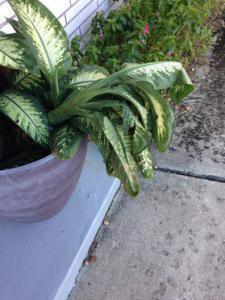It isn’t often that you have to worry about freeze warnings in Brevard County. That’s a great thing! However, when we do get a spell of cold weather as we did last week, there’s a mad dash to remember which plants need to be protected and which ones will be just fine when the temps drop. In fact, if you’re like many of us who once lived up north, there may be plants that you’ve planted in your yard that actually prefer the cold temps and are somewhat unhappy for a large part of the year.
Even if you’ve lived here for decades (or are a native like me), you sometimes make a rookie mistake or forget to provide the necessary cold weather care to your plants. One of the great things about living near the beach is that temps are generally warm enough to grow tropical plants like the one in the picture to the right in pots outside year long. However, as you can also see, these plants are not at all happy when on those infrequent nights the temps plummet and you’ve done nothing to prevent damage to their tender leaves and branches. If you’re lucky, you’ll just get a little wilting. If you’re not so lucky, your plants’ leaves will turn yellow, then brown, then drop off. This happens somewhat frequently (every few years) to my hibiscus plants. For those who live west of the Intracoastal Waterway, leaf drop in the winter is a real threat.

Central Florida is full of transplanted people, many coming from northern states like New York or Maryland. In most every other state in the US, there is a good chance of snowfall yearly and the plants that thrive are suited to a wide range of temperatures. Brevard County is not just in the south, but our climate is actually sub-tropical. It definitely takes a few years for the non-native to become accustomed to the nuances of this transitional zone.
If you’re a newcomer to the subtropics, you might still be thinking of hostas as the perfect shade plants and roses as great full sun plants. You might even be contemplating hollyhocks. Or perhaps you mistakenly think that tropical plants like longans or hibiscus will be safe in our warm climate and won’t need any frost protection. The suitability of many plants in our zone (9B) is a subject for another post. The purpose of this post is to give you a resource to refer back to when that very occasional cold snap comes along. Click here for an exceptional resource for keeping plants safe from cold in Florida. To become more fluent in the plants we grow and how to care for them, you might consider joining the Florida Native Plant Society or the Brevard Tropical Fruit Club. Both of these organizations hold monthly meetings that spotlight plant care and related topics.
Moving potted plants to places of warmth like a porch or garage is the easy and safe way to play it with small plants. However, for your plants that are firmly seated in the ground you’ll need to decide if they need some sort of protection. Getting credible information is important, especially if you have a pricey plant that’s in the ground. While many plants will eventually recover from a short frost, you might want to consider the effect to their aesthetics. Plants that experience cold temperatures below their tolerances will drop leaves and pruning may become necessary for some dead branches. That leaves you with a plant that may look really rough for a number of months or (hopefully not) years.
Many of the resources I turn to for plant care are sites of the big universities. The University of Florida has a large agricultural research center and a huge extension program. They have a super cool planting guide, which tells you which plants to put in the ground depending on region you live in and the month. Other universities, like the University of California and the University of Georgia have community outreach programs and are great resources for plantings in your yard.
Useful links to help you keep those plants safe:
http://www.southeastfloridaclimatecompact.org/wp-content/uploads/2016/03/USDA-Plant-Hardiness.pdf
http://solutionsforyourlife.ufl.edu/lawn-and-garden/florida-gardening-calendar/
http://marinmg.ucanr.edu/Marin_Master_Gardener_Help_Desk/Leaflet/How_to_protect_plants_from_frost/
http://extension.uga.edu/
http://edis.ifas.ufl.edu/mg025
http://www.brevardrarefruitcouncil.org/
http://www.conradina.fnpschapters.org/

Sharon Hughes
Administrative Coordinator @ Florida Coast Realty of Brevard
